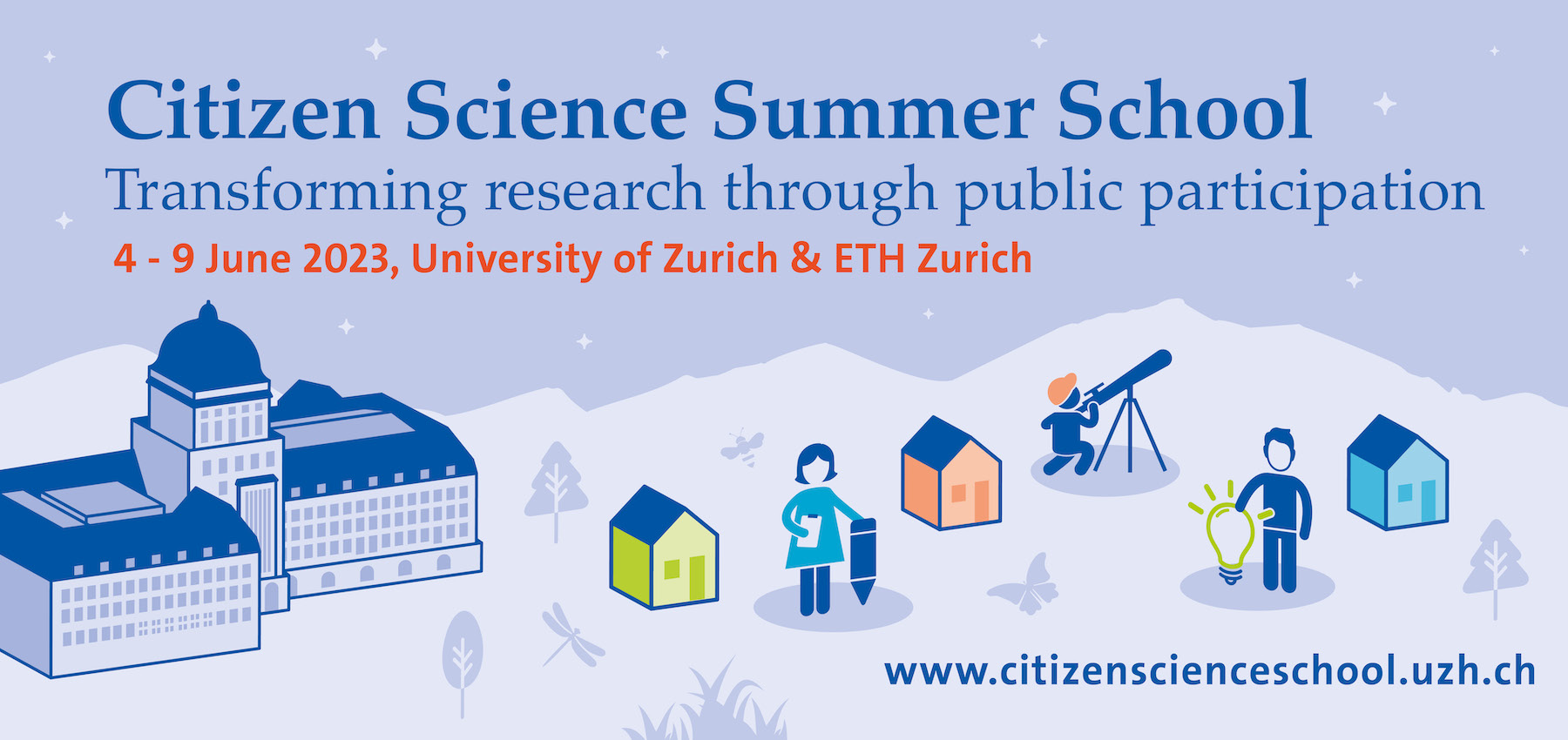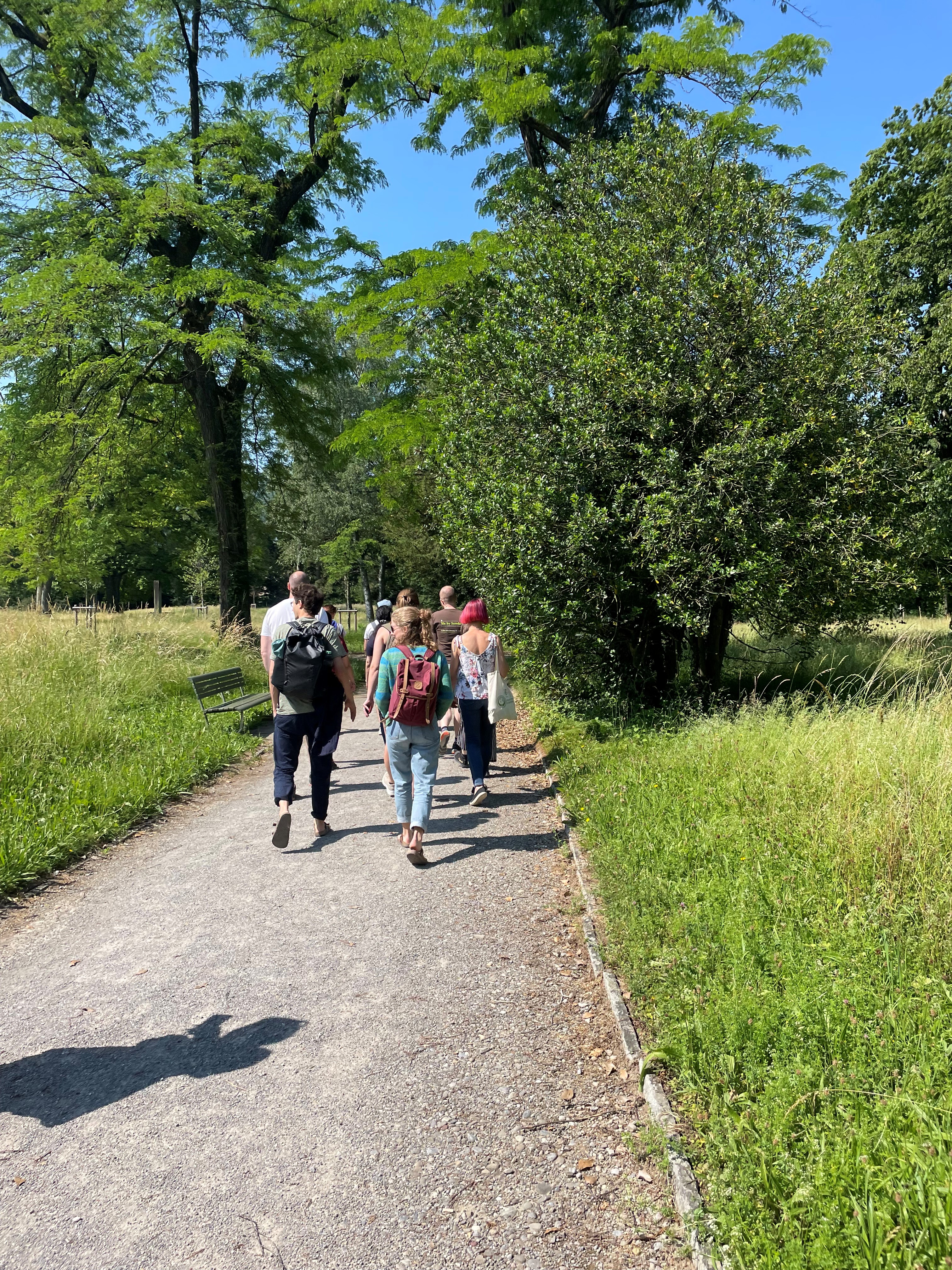Summer School 2023

In June 2023, we spent a week with 31 participants in the Citizen Science Summer School. Below you can find our detailed report.
Additionally, you can find information on the subpages:
From 4-9 June 2023, 31 PhD students, postdocs, and practitioners from 14 different countries participated in the Citizen Science Summer School. This was the third edition of the summer/winter schools, jointly organized by the Participatory Science Academy (University of Zurich UZH/ETH Zurich) and the Graduate Campus of the University of Zurich (UZH). In this report, we reflect on an intense week, provide an account of the sessions attended by our participants, and discuss the most important learnings.
During the Summer School, the participants engaged in a diverse program that included lectures, workshops, showcases of local Citizen Science projects, excursions, and a barcamp. Our goal was to introduce our participants to different Citizen Science approaches, encourage reflection on tools that could be implemented in their own projects, and provide them with the opportunity to connect and learn from each other.
Our participants had diverse disciplinary backgrounds, ranging from environmental science to education, health studies, and social anthropology. Some were new to Citizen Science while others had already conducted participatory research. The projects they were involved in covered topics such as water pollution in Italy, the mental health of cancer patients in Australia, the Haitian population's perception of earthquake risk, or on the spatial accessibility of pavements in Zurich. It was our participants’ different backgrounds and experiences that enabled lively discussions and an enriching exchange from start to finish!
This year, we focused on four key questions that we started to refer to as “The Blue Questions”:
- What is the potential of Citizen Science for increased dialogue between science and society?
- How can Citizen Science contribute to solving societal challenges and transforming science?
- What skills and competencies do researchers and citizens need to do Citizen Science?
- How can I improve equality and inclusion in and through my participatory research project?

After having gotten to know each other over games and dinner on Sunday evening, we immediately began the program on Monday morning. Anja Pawelleck led the kick-off session with a “Skills Identification” activity. Participants were asked to reflect on skills they already brought to the table, whether related to research, to group work, or to any other social setting. Many people remarked on how they appreciated the session; it allowed them to recognize and appreciate their skills and those of others, in contrast to focusing on what is lacking.
Following the welcome speeches by Prof. Dr. Elisabeth Stark (Vice President Research UZH) and Dr. Andrew Holland (Stiftung Mercator Schweiz), two colleagues from Austria, Daniel Dörler and Florian Heigl, gave the first Keynote speech. As the founders and coordinators of the Austrian platform Österreich forscht, which collects and lists all Citizen Science projects in Austria, Florian and Daniel continuously scrutinize whether a project falls within the scope of Citizen Science – and therefore question: “What even is Citizen Science?” They explored how Citizen Science differs from similar concepts such as Participatory Action Research (PAR) or Community-based monitoring (CBM). But it also opened a broad spectrum of different classifications of Citizen Science e.g., projects that only involve Citizen Scientists for data collection or data analysis, or others that start out as grassroots projects. They encouraged everyone to keep an open mind and to continuously explore the definition of Citizen Science.
Hindou Oumarou Ibrahim, our second Keynote speaker, emphasized the importance of working together with indigenous people. As an environmental activist and a member of Chad’s pastoralist Mbororo people, she drew from her vast experience in tackling challenges together with different local groups. For instance, fertile land in Chad is being drastically reduced because of climate change. Hindou has used collaborative tools such as 2D and 3D participatory mapping to help settle conflicts over land rights. During her speech, Hindou also recounted situations where indigenous people’s knowledge on weather changes had been ignored by academic scientists and later proven right, raising the question: what is recognized as science? Her examples point to how Citizen Science can contribute to solving social challenges and, in the process, transforming science itself.
Yvonne Riaño’s workshop introduced feminist and postcolonial approaches and thus picked up on many of Hindou Oumarou Ibrahim’s themes. Titled “Working With or About a Population?”, Yvonne presented the Minga Methodology, which she developed in 2014 in the context of a research project with migrant women in Switzerland. The Minga Methodology aims to create spaces of mutual learning and to produce knowledge in collaboration with what Yvonne calls "experts and professionals of daily life". Her workshop was thus strongly linked to the fourth “Blue Question”: how can equality within a research project be brought about?
Ruth Förster’s workshop ran in parallel and highlighted the transformative impact science can have on society when a project uses a participatory approach. It touched upon the questions of how Citizen Science can contribute to increased dialogue between science and society, and on the question of its potential to transform both areas. Ruth also introduced participants to variations of participatory research design. Through interactive exercises, they had the opportunity to apply the theoretical inputs to their individual research projects.
The participants brought a wealth of enriching experiences and diverse backgrounds to the event. To harness this opportunity for extensive peer learning, we organized a BarCamp on Wednesday. Rather than following a rigid agenda with formal presentations, our focus was on participant-driven sessions and open discussions. In the morning, we collaboratively determined the session topics, resulting in a diverse range of engaging discussions. These included broader themes like exchanging experiences on stakeholder engagement and delving into critical theory, as well as more specific topics such as crowdsourcing in biodiversity-related Citizen Science projects and strategies for going beyond. The participants greatly appreciated this format, and we hope it has fostered enduring research relationships.
Pia Viviani’s workshop on community management focused on how to find citizen scientists to collaborate in a specific research project. She asked participants to reflect on questions such as: Who are the actors and organizations I need to make my project successful? How can I catch their interest? And, importantly, how do I keep people interested in a project for a longer period? Pia’s workshop emphasized that these questions had to be considered at the beginning of a project planning process.
In parallel, Johanna Barnbeck ran a workshop on strategic communication and diverse audiences. One of the key questions covered was: How do you approach audiences who might not already be interested in science? Johanna’s workshop made participants reflect on the question of accessibility and how to improve equality and inclusion in a research project. She acquainted participants with the SciComm Format Canvas, which supports this process.

For a taste of different local initiatives, we also invited four projects for a Science Fair: CrowdWater, Know the Air You Breathe, Ideenlauf, and Long Covid Citizen Science Board. Additionally, we shared our own “in-house” knowledge on fundraising and the use of online tools with the participants who got to know more about the Project Builder, our online tool that makes it easy to set up a website and/or mobile application for a Citizen Science project.
On Friday, the last day, everyone joined either the excursion by StadtWildTiere(German for urban wildlife) or one by FrauenStadtRundGang Zürich (German for women city walk). During the former, organizers from StadtWildTiere took participants on a tour through the Sihlfeld cemetery and introduced them to various wildlife observation projects. StadtWildTiere has been running for more than 10 years and annually carries out projects that target one animal species, such as the B3 on wild bees. The alternative excursion by FrauenStadtRundGang led through Zurich’s former Chratz quarter, which used to be on the left bank of the Limmat. The tour guides introduced participants to the history of the area that used to be inhabited by a diverse population – until it was demolished to make way for a “modernized” Zurich in the 19th century. Our guides also recounted how women back then were not allowed to take baths in the river until finally, in 1888, the Frauenbadi was built. This open-air pool reserved for women is still running to this day.
During our final session, we addressed the four “Blue Questions” again. It became clear that they were all intrinsically linked. Our participants considered the potential for Citizen Science to bridge the gap between science and society to be high. It can contribute to democratizing science and support research that is indeed relevant to the people. However, this depends on (at least) three factors on the part of the researchers:
- First, on taking local knowledge seriously and on recognizing expertise that might look different to what many are used to from academia. This requires openness and curiosity.
- Second, researchers must ask themselves: who is not here discussing, and why? How can these people be included? Many skills are needed for this: being able to listen, to communicate, to facilitate, and in some cases also to mediate between opposing groups.
- Third, on recognizing that science is never conducted from a neutral perspective or in a vacuum – that means, trying to understand how the social structure influences all processes of life, including how knowledge is generated. This critical approach requires self-awareness.
Moreover, since participatory processes often require a lot of time, resources must be allocated to this process in funding schemes. Therefore, universities and funding bodies must embody this change. If these conditions are met, then the gap between science and society can be narrowed, research can hopefully be decolonized, and citizen science can contribute to solving social challenges.
After having held the 2021 school online, we were pleased to meet the participants in person this time around! Many of the discussions and exchanges happened during the coffee breaks, daily lunch from the Raemi59 Mensa, or our evening activities. We held a communal dal cooking one night (see photo below). And on our last evening, we attended the University of Zurich’s Mittelbaufest, the party for early-career researchers, where we ended up dancing to the live rock band Tesla Death Ray. For us as the organizing team, it was wonderful to see how people connected during these social events. We already look forward to organizing the next school in 2025. Sign up for our newsletter to stay up to date!
The Mercator Foundation Switzerland made it possible for us to organize the Citizen Science Summer School. We are very grateful for the support and are looking forward to the next Citizen Science School in 2025!
To learn more about our previous schools, please visit:
